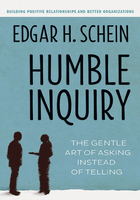
1 Humble Inquiry
When conversations go wrong, when our best advice is ignored, when we get upset with the advice that others give us, when our subordinates fail to tell us things that would improve matters or avoid pitfalls, when discussions turn into arguments that end in stalemates and hurt feelings—what went wrong and what could have been done to get better outcomes?
A vivid example came from one of my executive students in the MIT Sloan Program who was studying for his important finance exam in his basement study. He had explicitly instructed his six-year-old daughter not to interrupt him. He was deep into his work when a knock on the door announced the arrival of his daughter. He said sharply, “I thought I told you not to interrupt me.” The little girl burst into tears and ran off. The next morning his wife berated him for upsetting the daughter. He defended himself vigorously until his wife interrupted and said, “I sent her down to you to say goodnight and ask you if you wanted a cup of coffee to help with your studying. Why did you yell at her instead of asking her why she was there?”
How can we do better? The answer is simple, but its implementation is not. We would have to do three things: 1) do less telling; 2) learn to do more asking in the particular form of Humble Inquiry; and 3) do a better job of listening and acknowledging. Talking and listening have received enormous attention via hundreds of books on communication. But the social art of asking a question has been strangely neglected.
Yet what we ask and the particular form in which we ask it—what I describe as Humble Inquiry—is ultimately the basis for building trusting relationships, which facilitates better communication and, thereby, ensures collaboration where it is needed to get the job done.
Some tasks can be accomplished by each person doing his or her own thing. If that is the case, building relationships and improving communication may not matter. In the team sports of basketball, soccer, and hockey, teamwork is desirable but not essential. But when all the parties have to do the right thing—when there is complete, simultaneous interdependence, as in a seesaw or a relay race—then good relationships and open communication become essential.